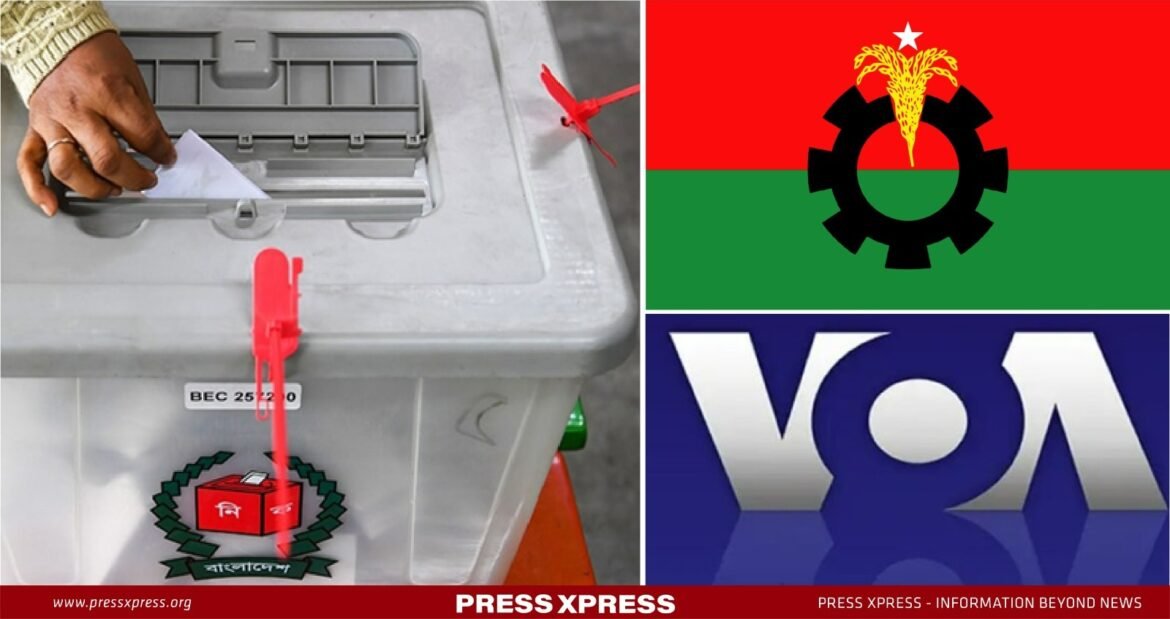Key Highlights
- Bangladesh remains steadfast in upholding its sovereignty and adheres to its constitution
- The report questions the credibility of BNP’s movement, citing failure in strategy and public distrust
- BNP’s leadership faces a choice – persist in violence or renounce it, purging individuals like Tarique Zia to regain credibility within the democratic framework
Voice of America recently released a report revealing that Bangladesh’s the Bangladesh Nationalist Party (BNP) has chosen to boycott the upcoming general elections due to their perception of a rigged voting process, citing an inability to participate. This decision has sparked concerns among pro-democracy advocates and analysts, highlighting doubts about the possibility of a fair and transparent electoral atmosphere. Bangladesh remains steadfast in upholding its sovereignty and adheres to its constitution in governance, maintaining autonomy in both domestic and foreign policies.
You Can Also Read: Undemocratic Genesis of BNP
Abdul Moyeen Khan, a member of the Bangladesh Nationalist Party, mentioned in the report that democracy in Bangladesh is in under Prime Minister Sheikh Hasina’s Awami League government, alleging an absence of free and fair elections. However, he acknowledged Bangladesh as a democratic nation where all political parties can engage in their activities without government objection.
The assertions made by Khan and the opposition party regarding the electoral process baseless. While concerns about the fairness of elections are voiced, the government maintains its commitment to democratic principles and constitutional directives governing national elections. The upcoming parliamentary polls are set to be conducted in accordance with these constitutional provisions.
Impact on BNP’s Prospects in the Ensuing Elections
The BNP’s choice to orchestrate violent protests prompts inquiries about its effectiveness and potential influence on the imminent national elections. While protests serve as a potent means to express discontent and mobilize support, resorting to violence poses the risk of isolating potential supporters and eroding the party’s credibility. Clashes between BNP activists and law enforcement agencies might deepen divisions in public opinion, portraying the party as disruptive and inclined toward unrest.
Moreover, advocating for a non-partisan caretaker government, although appealing to certain segments of the population, might not resonate universally. The caretaker government system has been eliminated in Bangladesh, with the ruling party contending its redundancy in ensuring fair elections. BNP’s persistence in seeking its revival might be construed as an attempt to gain advantage rather than a genuine pursuit of electoral integrity.
As the national elections approach, the BNP must meticulously assess the efficacy of its current strategy. It could be more constructive for the party to concentrate on forging alliances, participating in constructive discussions, and presenting lucid policy alternatives to gain the trust and backing of the electorate. By embracing a more inclusive and peaceful approach, the BNP could bolster its prospects in the elections and contribute to a robust democratic process in Bangladesh.
Caretaker Government Sought
The report says, since last year, the BNP has staged street protests demanding PM Hasina’s resignation and the installation of an impartial caretaker government around the election, says will ensure a free and fair election.
Senior Joint Secretary General of BNP Ruhul Kabir Rizvi commented that BNP has kept itself away from the elections because current government has not resigned and caretaker government has not been established. This information is absolutely untrue because the elections in Bangladesh are going to be organized according to the constitution. BNP’s only demand is Sheikh Hasina’s resignation which is a gross violation of the Constitution.
Anticipated Success in Elections
As Bangladesh gears up for the impending general elections, the political scenario remains marked by challenges and contentious dynamics, primarily revolving around the participation and concerns raised by the Bangladesh Nationalist Party (BNP) and other opposition entities.
Obaidul Quader, the general secretary of the ruling Awami League, has emphasized the readiness of the government for the forthcoming elections, despite the BNP’s decision to boycott. Quader pointed out that while the BNP is not officially partaking in the election as a party, 15 former Members of Parliament remain involved. He further highlighted the active participation of citizens, expressing confidence in the election’s success.
The BNP’s decision to boycott echoes historical grievances, citing issues of alleged government crackdowns and concerns over electoral fairness and transparency.
These past events have contributed to the erosion of trust in the electoral process, prompting concerns among opposition parties and pro-democracy advocates regarding the fairness and integrity of future elections.
Bangladesh stands at a critical juncture, where fostering an environment conducive to free, fair, and inclusive elections is indispensable for the nation’s democratic progress and political stability.
The Allegation, BNP Figures ‘Violently Targeted’
In the report, Rashed Iqbal, the acting president of Chhatradal, the student wing of the BNP, alleged that the state machinery is being manipulated to favor the ruling party, aiming to “eliminate” the political opposition. BNP figures ‘violently targeted’ this term is baseless.
The government is aggressively trying to suppress our efforts to reinstate democracy.” This statement cannot be accepted at all because BNP’s threat of movement has turned into a mockery to the country’s people. The leadership of BNP has encountered a significant and wide-ranging failure. Their strategic approach, presuming widespread public support for a violent campaign, has proven futile. Attempts to stir unrest amid the government’s vigilant stance have fallen short. Efforts to involve foreign entities in Bangladesh’s internal affairs have not only failed but have deepened public distrust and antipathy towards the BNP.
It’s crucial for BNP and its affiliates to acknowledge the resounding failure of their unlawful bid for power. The leadership faces a pivotal choice: persist in a path of violence and fade into irrelevance or renounce the tactics of violence and arson championed by Tarique Zia and reintegrate into democratic processes. However, this necessitates a critical step—purging individuals like Tarique who advocate violence, murder, and arson from the party. Only by transforming into a party dedicated to the people’s welfare can BNP regain credibility and relevance within the democratic framework.


